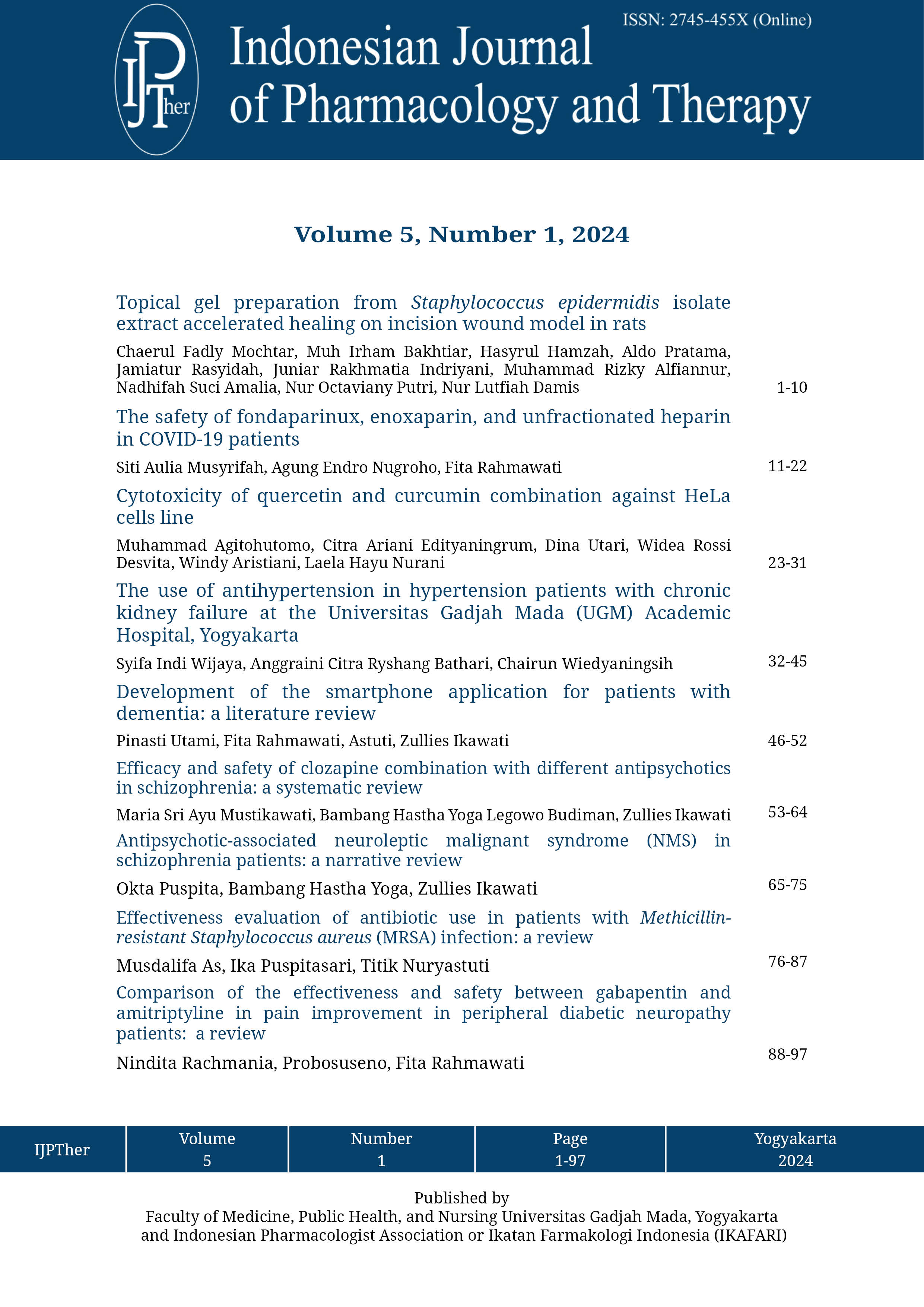Effectiveness evaluation of antibiotic use in patients with Methicillin-resistant Staphylococcus aureus (MRSA) infection: a review
Abstract
Methicillin-resistant Staphylococcus aureus (MRSA) is a pathogen that become a public health problem due to its ability to be resistant to more than three classes of antibiotics. Evaluation of the effectiveness of antibiotic use in patients with MRSA is important to optimize antibiotic use and to control antibiotic resistance. This article review attempted to evaluate the effectiveness of antibiotics in patients with MRSA. This review explored the results of previous research from PubMed as a literature source and the PRISMA flow diagram as a protocol for the article selection process. Eight studies reviewed the evaluation of the effectiveness of antibiotic use in MRSA patients with various clinical conditions, such as uncomplicated wound infections, cellulitis and no wound, purulent drainage or abscess, cSSSI infections caused by MRSA, infections caused by MRSA bacteremia and nosocomial infections caused by MRSA. In conclusion, the effectiveness of antibiotics in patients with MRSA infection depends on the clinical condition of each patient. Therefore, the use of antibiotics is adjusted based on the type of infection and the efficacy of the antibiotics. Combination therapy is recommended for MRSA patients considering its life-threatening ability.
References
Kementerian Kesehatan Republik Indonesia. Permenkes nomor 28 tahun 2021 tentang pedoman penggunaan antibiotik. Jakarta: Kementerian Kesehatan Republik Indonesia, 2021. Available from: https://peraturan.go.id/id/permenkes-no-28-tahun-2021
Centers for Disease Control and Prevention (CDC). Antibiotic resistance threats in the United States 2019 - Google Search [Internet]. 2019 [cited 2023 Jan 27].
Tacconelli E, Carrara E, Savoldi A, Harbarth S, Mendelson M, Monnet DL, et al. Discovery, research, and development of new antibiotics: the WHO priority list of antibiotic-resistant bacteria and tuberculosis. The Lancet Infect Dis 2018;18(3):318-27.
Vestergaard M, Frees D, Ingmer H. Antibiotic resistance and the mRSA problem. Microbiol Spect 2019 22;7(2):GPP3-0057-2018.
https://doi.org/10.1128/microbiolspec.GPP3-0057-2018
Kementerian Kesehatan Republik Indonesia. Permenkes nomor 8 tahun 2015 tentang program pengendalian resistensi antimikroba di Rumah Sakit. Jakarta: Kementerian Kesehatan Republik Indonesia, 2015. Available from: https://peraturan.go.id/id/permenkes-no-8-tahun-2015
Hasanpour AH, Sepidarkish M, Mollalo A, Ardekani A, Almukhtar M, Mechaal A, et al. The global prevalence of Methicillin-resistant Staphylococcus aureus colonization in residents of elderly care centers: a systematic review and meta-analysis. Antimicrob Resis Infec Control 2023 29;12(1):4.
https://doi.org/10.1186/s13756-023-01210-6
Dahesihdewi A, Dewi YP, Sugianli AK, Parwati I. Surveilans bakteri resistan multi obat dan kepekaannya terhadap antibiotik di rumah sakit Indonesia tahun 2018. [Laporan]. Jakarta: Perhimpunan Dokter Spesialis Patologi Klinik dan Laboratorium Indonesia, 2019.
Melese A, Genet C, Andualem T. Prevalence of vancomycin resistant enterococci (VRE) in Ethiopia: a systematic review and meta-analysis. BioMed Central Infect Dis 2020 11;20(1):124.
https://doi.org/10.1186/s12879-020-4833-2
Paul M, Bishara J, Yahav D, Goldberg E, Neuberger A, Ghanem-Zoubi N, et al. Trimethoprim-sulfamethoxazole versus vancomycin for severe infections caused by Meticillin resistant Staphylococcus aureus: randomised controlled trial. Br Med J 2015; 14;350:h2219.
https://doi.org/10.1136/bmj.h2219
Geriak M, Haddad F, Rizvi K, Rose W, Kullar R, LaPlante K, et al. Clinical data on daptomycin plus ceftaroline versus standard of care monotherapy in the treatment of Methicillin-resistant Staphylococcus aureus bacteremia. Antimicrob Agents Chemother 2019 25;63(5):e02483-18.
https://doi.org/10.1128/AAC.02483-18
Tong SYC, Lye DC, Yahav D, Sud A, Robinson JO, Nelson J, et al. Effect of vancomycin or daptomycin with vs without an antistaphylococcal β-lactam on mortality, bacteremia, relapse, or treatment failure in patients with MRSA bacteremia: a randomized clinical trial. JAMA 2020;323(6):527-37.
https://doi.org/10.1001/jama.2020.0103.
Pujol M, Miró JM, Shaw E, Aguado JM, San-Juan R, Puig-Asensio M, et al. Daptomycin plus fosfomycin versus daptomycin alone for Methicillin-resistant Staphylococcus aureus bacteremia and rndocarditis: a randomized clinical trial. Clin Infect Dis 2021; 72(9):1517-25.
https://doi.og/ 10.1093/cid/ciaa1081.
Talan DA, Lovecchio F, Abrahamian FM, Karras DJ, Steele MT, Rothman RE, et al. A randomized trial of clindamycin versus trimethoprim-sulfamethoxazole for uncomplicated wound infection. Clin Infect Dis 2016;62(12):1505-13.
https://doi.org/10.1093/cid/ciw177
Moran GJ, Krishnadasan A, Mower WR, Abrahamian FM, LoVecchio F, Steele MT, et al. Effect of cephalexin plus trimethoprim-sulfamethoxazole vs cephalexin alone on clinical cure of uncomplicated cellulitis: a randomized clinical trial. JAMA 2017;317(20):2088-96.
https://doi.org/10.1001/jama.2017.5653
Kauf TL, McKinnon P, Corey GR, Bedolla J, Riska PF, Sims M, et al. An open-label, pragmatic, randomized controlled clinical trial to evaluate the comparative effectiveness of daptomycin versus vancomycin for the treatment of complicated skin and skin structure infection. BioMed Central Infect Dis 2015;15:503.
https://doi.org/10.1186/s12879-015-1261-9
Equils O, da Costa C, Wible M, Lipsky BA. The effect of diabetes mellitus on outcomes of patients with nosocomial pneumonia caused by methicillin-resistant Staphylococcus aureus: data from a prospective double-blind clinical trial comparing treatment with linezolid versus vancomycin. BioMed Central Infect Dis 2016;16(1):476.
https://doi.org/10.1186/s12879-016-1779-5
Turner NA, Sharma-Kuinkel BK, Maskarinec SA, Eichenberger EM, Shah PP, Carugati M, et al. Methicillin-resistant Staphylococcus aureus: an overview of basic and clinical research. Nat Rev Microbiol 2019;17(4):203-18.
https://doi.org/10.1038/s41579-018-0147-4
Liu C, Bayer A, Cosgrove SE, Daum RS, Fridkin SK, Gorwitz RJ, et al. Clinical practice guidelines by the infectious diseases society of america for the treatment of Methicillin-resistant Staphylococcus aureus infections in adults and children: executive summary. Clin Infect Dis 2011;52(3):285-92.
https://doi.org/10.1093/cid/cir034
Randolph AG, Xu R, Novak T, Newhams MM, Bubeck Wardenburg J, Weiss SL, et al. Vancomycin monotherapy may be insufficient to treat Methicillin-resistant Staphylococcus aureus coinfection in children with influenza-related critical illness. Clin Infect Dis 2019;68(3):365-72.
Williams DJ, Cooper WO, Kaltenbach LA, Dudley JA, Kirschke DL, Jones TF, et al. Comparative effectiveness of antibiotic treatment strategies for pediatric skin and soft-tissue infections. Pediatrics 2011;128(3):e479-487.
https://doi.org/10.1542/peds.2010-3681
Nandhini P, Kumar P, Mickymaray S, Alothaim AS, Somasundaram J, Rajan M. Recent developments in Methicillin-resistant Staphylococcus aureus (MRSA) treatment: a review. Antibiotics 2022;11(5):606.
https://doi.org/10.3390/antibiotics11050606
Boswihi SS, Udo EE. Methicillin-resistant Staphylococcus aureus: an update on the epidemiology, treatment options and infection control. Curr Med Res Pract 2018;8(1):18-24.



